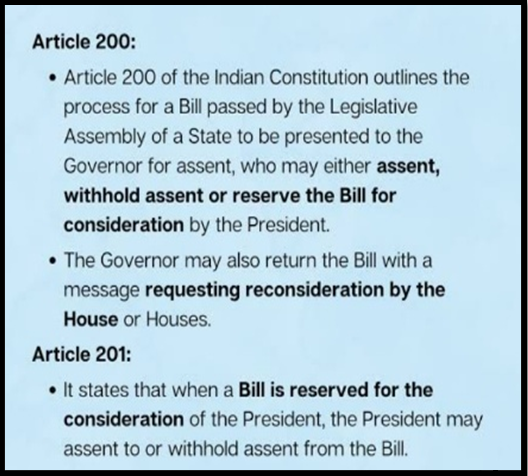GOVERNOR CRITICIZED FOR REFERRING BILLS TO PRESIDENT
Tamil Nadu government criticizes Governor R.N. Ravi for referring 10 re-enacted Bills to the President, alleging “constitutional obstinacy.”
Supreme Court’s Stand on Governor’s Actions:
- A three-judge Bench led by Chief Justice D.Y. Chandrachud asserts that once the Governor withholds assent, he cannot later refer re-passed Bills to the President.
- According to the Chief Justice, withholding assent requires sending Bills back to the Assembly under Article 200.
- If the Assembly re-passes the Bills, the Governor is obligated to grant assent in the re-enacted form, as per the law settled in a previous judgment.
Attorney-General’s Defence:
- Attorney-General R. Venkataramani argues that the Governor had only withheld assent on November 13 and did not technically send the Bills back for reconsideration.
Interpretation of First Proviso of Article 200:
- The Attorney-General suggests that the first proviso operates when the Governor sends messages suggesting amendments or recommendations, not in cases of withholding consent.
- Governor’s Option Under Article 200:The Attorney-General’s submissions imply that the
Governor may have considered the Bills as fresh, exercising the option under Article 200 to refer them to the President.
- State Government’s Response: They argue that there is no category of keeping Bills hanging perpetually, and the Governor cannot kill Bills indefinitely.
- Supreme Court’s Suggestion: Chief Justice Chandrachud urges the Governor to resolve the impasse with the Chief Minister through discussion.




